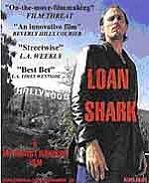Redevelopment Morphs Into Loan Sharking
By Wayne Lusvardi
California redevelopment agencies may have been phased out. But cities are getting into the business of loan sharking to offset a decline in sales and property taxes.
Last week the Ventura City Council voted 6 to 0 to borrow $850,000 at 4 percent interest from Rabobank. Rabobank is a self-described “sustainable lender” located in the Netherlands. In turn, the city loaned that money to “Players Casino” in Ventura at 8 percent interest for the expansion of their facilities.
This is a version of a “buy low” and “sell high” strategy. Only in this case it is “borrowing at a low interest rate” and “lending at a higher rate.” It’s called arbitraging in finance.
Arbitraging is expressly forbidden with tax-exempt bonds. That is because local government is a tax-exempt organization. It could potentially borrow cheap money at tax-exempt rates and re-invest it at a higher market rate. It thus could reap a profit with the public’s cheap money. All this is illegal under Regulation 1.148-0(a) of the I.R.S Code.
This explains why the city of Ventura used a private lender in the Netherlands to borrow money from instead of using bond funds. It is not illegal to arbitrage bank funds.
The way the city of Ventura spins it: it is “restoring confidence and lending to a casino.” The city also denies that the city itself is a “bank.”
It may technically not be a bank. But it is acting as a loan broker for private borrowers. And it is tacking on double the rate of interest for the trouble of brokering the loan.
‘Low risk’?
Cities such as Ventura claim such loans are low risk because they usually are for a small fraction of the total property value. Typically the loans are secured by the total value of the property as collateral.
The city also holds the casino’s gaming license. Thus, if the casino defaulted on the loan, the city could require any buyer of the casino to pay off the loan as a condition of assuming the license.
The city of Ventura further justifies the loan because it will receive $37,000 in interest on the loan over two years. It also will receive $177,000 per year in additional sales and business taxes. This is in addition to the $260,000 every three months it already receives in taxes from the operation of the casino. The casino is generating about $1.2 million per year in taxes to the city. The city operating fund budget is about $88.8 million a year.
The taxpayers of Ventura have no opposition to such lending practices because tax increases can be avoided. Instead, the city indirectly raises taxes on gamblers who patronize casinos. Ventura voters have reportedly rejected tax increases twice in recent years.
But if these loans are not a high risk why, is the interest rate doubled? Interest rates serve as a substitute or indicator of risk. In fact, they are often called a “risk rate.” The higher the risk, the higher the interest rate and vice versa. A loan for double the interest rate would indicate a loan with double the risk. Eight percent would be a “junk bond” interest rate in the private sector today.
But if the risk in fact is indeed low as the city claims, then the city must be acting as a loan shark. Arbitraging is a form of speculative loan sharking. Thus, cities that no longer have redevelopment agencies are getting into the loan sharking business.
A loan shark is informally defined as “one who lends money at exorbitant interest rates, especially one financed and supported by an organized crime network.” What the city of Ventura does is legal, however.
How will the money be spent?
But probably the bigger question is: What will the city of Ventura use the tax revenues it gains from such loans for?
If it is dedicated to defined benefit pensions and health benefits, this could obligate the taxpayers to pay greater and greater taxes for unrealistic pensions. There is no requirement in the city or county of Ventura to reform public pensions as a condition for getting into the loan sharking business. Liberal cities are apparently more concerned about symbolically borrowing money from “sustainable lenders” than reforming pensions so that they are sustainable.
A state moratorium bans new casinos until the year 2020. If the number of casinos is reduced, where will the city of Ventura stand with its dependence on casinos tax revenues?
It is perhaps symbolic that the Players Casino in Ventura is housed in the former Ventura Auto Center Mall facilities. Market capitalism has apparently died in Ventura and in much of California. It has been replaced with state capitalism that grants monopoly licenses for enterprises such as gambling that just redistribute wealth instead of creating real wealth.
The state of California has gotten into the business of financing unneeded and deadweight affordable housing, stem cell research, bullet trains, renewable energy and redevelopment. Look for cities to likewise start using their permitting powers together with loan arbitraging to create or enlarge more businesses that don’t increase overall productivity but generate taxes to keep “loan shark” governments with enough little fish to eat.
Related Articles
Legislature picks aerospace winner
An Air Force request for proposal (RFP) for the next generation stealth bomber is about to hit the street.
Municipal Bankruptcy Stalks Stockton
FEB. 27, 2012 By WAYNE LUSVARDI Stockton, California’s 13th largest city, may be moving from “Fat City” to “Mudville.” Both
California’s income tax rate drives NFL players away
Last month on CalWatchdog.com, prompted by the efforts to build a Los Angeles football stadium and lure an NFL team,





